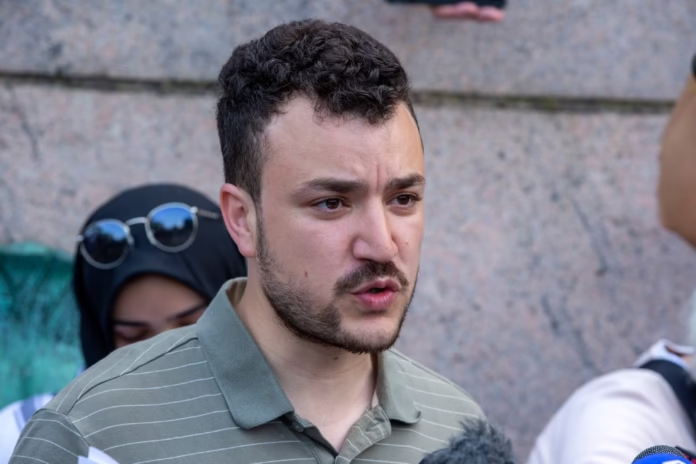On June 20, 2025, pro‑Palestinian activist and Columbia University graduate Mahmoud Khalil walked out of an ICE facility in Jena, Louisiana, after more than 104 days in detention. His release came on the strength of a bail order from U.S. District Judge Michael Farbiarz, who ruled that Khalil’s prolonged confinement on immigration charges likely amounted to unconstitutional punishment for his political speech reuters.comtime.com.
Background of the Detention
Khalil was first detained on March 8, 2025, shortly after participating in campus demonstrations that drew attention to the war in Gaza. The Trump administration invoked a seldom‑used section of the Immigration and Nationality Act of 1952, citing vague national‑security interests, and later suggested his green‑card application contained omissions. Throughout this period, Khalil’s lawyers argued that he posed no flight risk or danger to the community and that the government’s shifting justifications reflected retaliation for his anti‑Israel speech wsj.com.
Legal Battle and Judge’s Ruling
Judge Farbiarz first signaled serious doubts about the government’s authority when he deemed the foreign‑policy removal provision likely unconstitutional due to vagueness. Despite a last‑minute government filing alleging paperwork errors, the court found no evidence of violence or property damage linked to Khalil. In his written opinion, Farbiarz emphasized that the record showed “a lack of anything that would be characterized as inciting violence” and described the detention of a lawful permanent resident on such grounds as “highly unusual” time.com.
Response from the Trump Administration
Officials from the Department of Homeland Security sharply criticized the ruling and announced plans to appeal both the release order and a separate preliminary injunction. The administration has described Khalil as a national‑security risk, though it has yet to provide concrete evidence to back that claim. Meanwhile, civil‑rights groups and many on campus hailed the decision as a victory for free speech and due process, warning that the administration’s aggressive immigration tactics risk silencing political dissent.
Implications for Free Speech and Immigration Rights
Khalil’s case has set a powerful precedent for how courts may approach detentions of permanent residents on speech‑related grounds. Legal experts note that far older immigration laws carry the potential for misuse when applied without strict constitutional safeguards. Moving forward, immigrant activists and their lawyers may feel emboldened to challenge similar detentions, especially when no credible evidence supports claims of harm or flight risk.
Short Analysis
It strikes me that this episode reveals a deeper tension in our system, where broad laws drafted in another century now collide with modern protest movements. On one hand, governments have a duty to protect security; on the other, they must not wield immigration statutes as tools to punish dissent. Judge Farbiarz’s ruling underscores the importance of impartial courts in checking executive overreach. If we value open debate, we must ensure that political speech—even speech we find provocative—remains protected, and that immigration enforcement stays rooted in clear, evidence‑based standards rather than shifting political winds.

